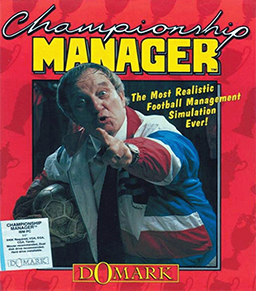Championship Manager (video game)
1992 video game From Wikipedia, the free encyclopedia
Championship Manager is the first game in the Championship Manager series of football management simulation video games. The game was released in September 1992 on Atari ST and Amiga,[2] and ported to MS-DOS soon after. The game was written by Paul and Oliver Collyer, the co-founders of Sports Interactive.
This article needs additional citations for verification. (September 2010) |
| Championship Manager | |
|---|---|
 MS-DOS cover art | |
| Developer(s) | Intelek |
| Publisher(s) | Domark |
| Designer(s) | Paul Collyer Oliver Collyer |
| Composer(s) | Barry Leitch |
| Series | Championship Manager |
| Platform(s) | MS-DOS, Amiga, Atari ST |
| Release | 15 May 1992[1] |
| Genre(s) | Sports |
| Mode(s) | Single player, multiplayer |
Gameplay
The game featured four playable English divisions (First through to Fourth; the newly formed FA Premier League did not appear until Championship Manager 93/94). In the game, each division contained only 20 teams, whereas in real life they contained 22 or 24 teams at that time. Also included were all of the major domestic cups of the time (including the Anglo-Italian Cup) and the three major European trophies (including the now defunct Cup Winners' Cup).
Any teams outside of the four playable divisions and all foreign teams had no player names at all. Instead, players were simply called No. 3 or No. 10 depending on which position they played. One of the most innovative things about the game was the introduction of average ratings for players; after each match, the performance of every player was graded from 0 to 10, and as the season went on the player's average rating would allow the manager to easily see how each player was performing.
Other versions
In 1993, Intelek and Ubisoft used the Collyers' game code to produce a version for the French market, known as Guy Roux Manager (named after the legendary AJ Auxerre manager Guy Roux). It was fully localised for France and included the French first and second divisions as playable leagues, and all text and commentary in French. The Guy Roux Manager franchise has since become a very popular and long running franchise in France with games on many platforms.
Also in 1993, the first Norwegian version was released. This was followed an year later by the Italian version. While the Norwegian version was very much similar to the English one, Italian version allowed the player to substitute up to four players in any match and the transfer deadline occurred much earlier in the season. Both the Norwegian and Italian versions featured real named players though, adding to the popularity of the game.
Development
Paul, the older of the Collyer brothers, created a precursor to the game on a BBC Micro computer from their childhood home in rural Shropshire in 1983. He recalled: "We didn’t even have Teletext back then as we had such a terrible TV signal ... I would listen to the radio to get the results, then type them in to the computer and it would update the league tables on the screen. That was my first venture into football programming."[3] Electronic Arts reportedly turned down the chance to publish Championship Manager in 1992, as it did not feature enough "live action", with match commentary provided via a text interface.[4]
Reception
The release of this first version of the game was not an outstanding success with sales at a reported 20,000.[3] Reviews ranged from the encouraging to the dismissive. Even by early 1990s standards, the graphics of Championship Manager were primitive and there were many other management games available that were much more visually pleasing, such as Premier Manager and The Manager. Critics berated the lack of any real graphics, other than coloured text on top of a background image and the complete lack of any sound effects. Furthermore, what became known as the match engine was very basic, consisting of a clock, three small meters showing each team's possession, and lines of text commentary describing the match action. Rival game The Manager included a small screen showing TV-style clips of match action. Another drawback was the absence of real player names, as each team was populated with players generated at random by the computer.
See also
- Football Manager (1982 series)
- Football Manager (2004 series), the Championship Manager series renamed by Sports Interactive
- Football Manager 2005, the first entry in the series after a dispute between Eidos and Sports Interactive in 2004
References
External links
Wikiwand - on
Seamless Wikipedia browsing. On steroids.
